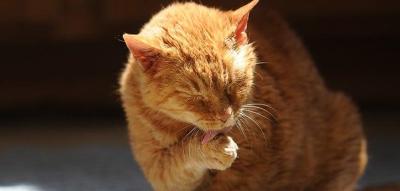
Cat Hair Loss: Causes and Treatment
Should I be concerned if my cat is losing hair? Cat hair loss (alopecia) can occur for many different reasons, and identifying what's behind a cat's loss of fur can take some work. Learn more about why your cat's hair is falling out and how to treat cat hair loss.
What causes hair loss in cats?
Hair loss in cats can have fungal and parasitic causes, such as ringworm, mites, or flea allergies. Food allergies are another possibility, as are metabolic conditions such as hyperthyroidism (overproduction of thyroid hormones). In some cats, urinary tract issues can cause continual licking with hair loss as a result.
Answers to the following questions can help reveal the cause of your cat's hair loss:
- Does your cat groom a lot?
- Is your cat itchy and often scratching?
- If you have other cats, what is the cat's relationship with them — harmonious or contentious?
- Have you changed anything in your home lately that could be causing increased stress in your cat?
Excessive grooming in cats
If your cat appears to be healthy otherwise, it’s possible that over-grooming to reduce stress — also known as displacement grooming — might be what’s behind the bald patches. Displacement grooming can lower a cat’s stress level, helping to calm the cat and deflect aggression from other individuals. It is common to see a cat who’s in a stressful situation suddenly begin to groom.
Home starts with you
Over time, this displacement behavior can become independent of the initial stressor and eventually become compulsive in nature. This condition is known as “psychogenic alopecia.” (Psycho means “of the mind,” genic means “producing or arising from,” and alopecia means “hair loss.”) This type of alopecia generally occurs on the inner forelimbs, the rear area of the abdomen, the groin region, the tail, and/or the lower back area, and it may or may not be symmetric. The hair loss occurs only in places that can be reached by the cat’s tongue; secondary skin changes, such as redness or bumps, are rarely evident.
Cat hair loss treatments
To find out more about what’s going on, take your cat to your veterinarian for a complete exam, including blood work, a thyroid function check, and a urinalysis. These tests will help to rule out any metabolic causes of your cat's hair loss, such as Cushing’s disease (which is rare in cats), hyperthyroidism, or urinary tract disease.
One study examining cats with a presumptive diagnosis of psychogenic alopecia found that medical causes of itching and hair loss were identified in 76% of the cats, while only 10% of the cases were found to be purely behavioral. The remaining 14% involved a combination of psychogenic alopecia and medical causes of itching and hair loss.
Reducing a cat's stress level
If your cat’s lab results are all normal and there is no evidence of other causes, you might wonder what to do next to help your cat. Because psychogenic alopecia is based on emotional states of stress, anxiety, and frustration, focus on minimizing stress for your kitty. Here are some ways to do that:
- Place perches and climbing posts in key areas, such as in front of a window. This can encourage cats to express their natural tendency to rest on high surfaces and view their environment from above.
- To enrich your cat's environment and offer privacy, give your cat access to some cardboard boxes and paper bags (with the handles removed for safety).
- Play with your cat using interactive toys, such as a feather wand, to stimulate a cat's natural hunting instincts and help burn off excess energy.
- Get a Feliway diffuser, which releases a synthetic version of a feline pheromone that has a calming effect.
- Other options for providing enrichment include scattering kibble around to encourage your cat to “hunt” for food, offering nontoxic cat grasses or catnip, and giving your cat food puzzle toys.
Anti-anxiety supplements and medications for cat fur loss
If stress-reducing modifications are not successful, or if your veterinarian feels additional intervention is necessary to treat your cat's hair loss, anti-anxiety supplements such as Anxitane or Composure can be considered. There are also calming food options on the market by brands such as Royal Canin or Science Diet that might help. If further therapy is needed, talk to your vet about putting your cat on an anti-anxiety medication, such as Fluoxetine or Paroxetine.
With so many potential underlying causes, fur loss in cats can be a difficult thing to resolve. The key is to keep an open dialogue going with your vet and to explore the solutions that feel right for you and your sweet feline.
